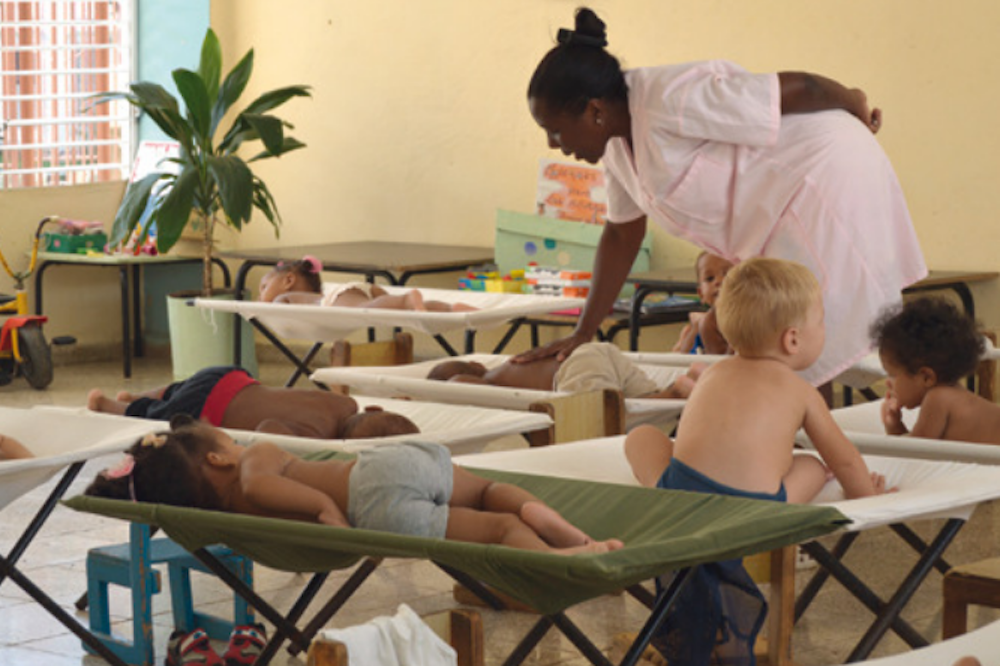
Why Cuba is leading the way on early childhood development
Childcare, Early childhood development, Safe pregnancy and birth
A combination of government programmes and family involvement are key to the country's great strides in nurturing their young children.
Cuba is a world leader when it comes to early childhood development – with more than 99.5% of young children going to nursery.
Almost 900,000 Cuban children under six attend a learning facility, according to the education ministry.
Compare this to what’s happening in the United States – where 38% of three-year-olds, 67% of four-year-olds and 8% of five-year-olds were enrolled in pre-primary programmes.
Ethnic background, education of parents and race play a part, with Asian-American children the highest attendees.
Figures from the US Department of Education also show that six out of 10 four-year-olds are not enrolled in publicly-funded pre-schools.
It’s a very different picture in Cuba, just 100 miles off the Florida coast.
In the island nation, programmes for early childhood development have been a priority for more than 60 years.
Over those decades, they realised that early childhood is a key period for brain development. And they have invested in their young population.
During the early years of life, and especially in the first 1000 days, a child’s brain develops rapidly and can be impacted depending on their experiences.
Positive experiences – such as good nutrition, stimulation and a safe environment – help the development of a child’s brain. Negative experiences, such as prenatal alcohol exposure, trauma and nutritional deficiencies, obviously have adverse effects.
Theirworld’s #5for5 campaign highlights five key factors which are needed in the first five years of life to provide nurturing care – nutrition, health, learning, play and protection.
But it’s not just the Cuban government which has stepped up – families are also a major reason why young children are being so well supported.
Richard Paterson, Cuba director for the international charity CARE, said the government has made health and education national priorities.
“The low infant mortality rate is clear evidence of the attention the authorities have put on health and early child development in particular,” he said.
“CARE does not programme specifically in ECD. But through our work and interactions with various local counterparts, with rural and urban families and with authorities at different levels, we have been able to appreciate the commitment and the reach of programmes such as the Casas de Abuelos and the Circulos Infantiles (early childhood development) and others.
“Clearly the government puts a high priority on child development, starting even at the pre-natal stage when pregnant mothers are visited at their homes on a weekly basis. In some instances, even more frequently.”
A UNICEF publication last year documented the Cuban ECD system’s implementation strategies and most significant results.

The report Early Childhood Development in Cuba said: “Family is the centrepiece of the Cuban system. Cuba strives to equip families with the necessary skills and knowledge to create stimulating, caring and safe home environments.
“Day care centres involve families through monthly group activities, while family doctors provide information on appropriate nutrition and preventing injuries in the home.
“Families are seen as embedded in communities, which share responsibility for children alongside state service providers.”
Four key points were found:
- Family is integral in getting the best environment for children
- Learning programmes are being set up in local communities
- Risk prevention and early detection are key – the model remedies potential threats to a child’s development
- Diversity is embraced – ECD services are accessible to all children, including the most vulnerable and those with disabilities
CARE’s Richard Paterson said: “There is an important cultural element to a child’s upbringing in Cuba.
“As in much of Latin America, the entire family plays an important part in a child’s development, and with multiple generations under the same roof, this engagement and support occurs on a daily basis.
“Cubans are rightly proud of the gains that the country has made, particularly in health and education. The ECD programme is a clear example.”

More news

MyBestStart programme gives young girls the education they deserve
